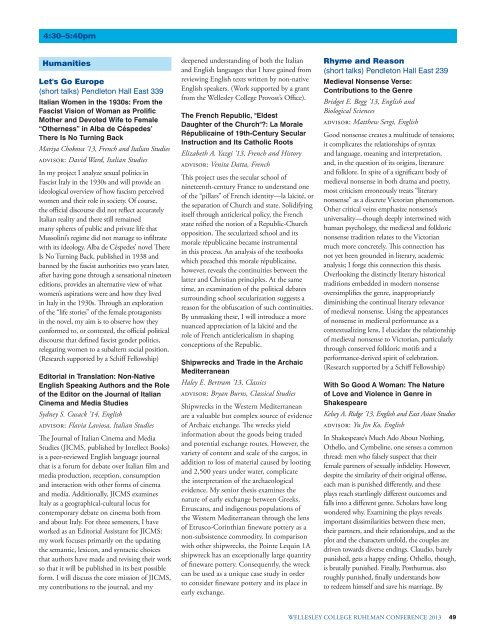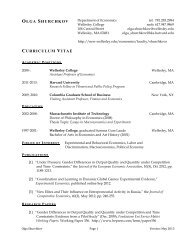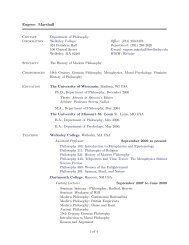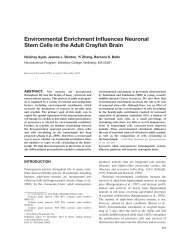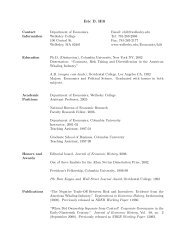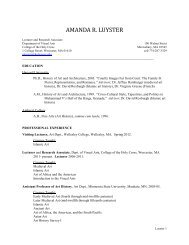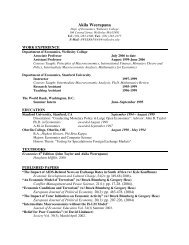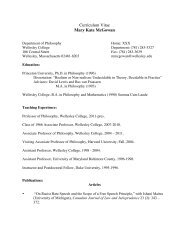Complete Conference Program - Wellesley College
Complete Conference Program - Wellesley College
Complete Conference Program - Wellesley College
You also want an ePaper? Increase the reach of your titles
YUMPU automatically turns print PDFs into web optimized ePapers that Google loves.
4:30–5:40pm<br />
Humanities<br />
Let's Go Europe<br />
(short talks) Pendleton Hall East 339<br />
Italian Women in the 1930s: from the<br />
fascist Vision of Woman as Prolific<br />
mother and Devoted Wife to female<br />
“otherness” in Alba de Céspedes’<br />
There Is No Turning Back<br />
Mariya Chokova ’13, French and Italian Studies<br />
AdvisoR: David Ward, Italian Studies<br />
In my project I analyze sexual politics in<br />
Fascist Italy in the 1930s and will provide an<br />
ideological overview of how fascism perceived<br />
women and their role in society. Of course,<br />
the official discourse did not reflect accurately<br />
Italian reality and there still remained<br />
many spheres of public and private life that<br />
Mussolini’s regime did not manage to infiltrate<br />
with its ideology. Alba de Céspedes’ novel There<br />
Is No Turning Back, published in 1938 and<br />
banned by the fascist authorities two years later,<br />
after having gone through a sensational nineteen<br />
editions, provides an alternative view of what<br />
women’s aspirations were and how they lived<br />
in Italy in the 1930s. Through an exploration<br />
of the “life stories” of the female protagonists<br />
in the novel, my aim is to observe how they<br />
conformed to, or contested, the official political<br />
discourse that defined fascist gender politics,<br />
relegating women to a subaltern social position.<br />
(Research supported by a Schiff Fellowship)<br />
editorial in Translation: Non-Native<br />
english Speaking Authors and the Role<br />
of the editor on the Journal of Italian<br />
Cinema and media Studies<br />
Sydney S. Cusack ’14, English<br />
AdvisoR: Flavia Laviosa, Italian Studies<br />
The Journal of Italian Cinema and Media<br />
Studies (JICMS, published by Intellect Books)<br />
is a peer-reviewed English language journal<br />
that is a forum for debate over Italian film and<br />
media production, reception, consumption<br />
and interaction with other forms of cinema<br />
and media. Additionally, JICMS examines<br />
Italy as a geographical-cultural locus for<br />
contemporary debate on cinema both from<br />
and about Italy. For three semesters, I have<br />
worked as an Editorial Assistant for JICMS:<br />
my work focuses primarily on the updating<br />
the semantic, lexicon, and syntactic choices<br />
that authors have made and revising their work<br />
so that it will be published in its best possible<br />
form. I will discuss the core mission of JICMS,<br />
my contributions to the journal, and my<br />
deepened understanding of both the Italian<br />
and English languages that I have gained from<br />
reviewing English texts written by non-native<br />
English speakers. (Work supported by a grant<br />
from the <strong>Wellesley</strong> <strong>College</strong> Provost’s Office).<br />
The french Republic, "eldest<br />
Daughter of the Church"?: la morale<br />
Républicaine of 19th-Century Secular<br />
Instruction and Its Catholic Roots<br />
Elizabeth A. Yazgi ’13, French and History<br />
AdvisoR: Venita Datta, French<br />
This project uses the secular school of<br />
nineteenth-century France to understand one<br />
of the “pillars” of French identity—la laïcité, or<br />
the separation of Church and state. Solidifying<br />
itself through anticlerical policy, the French<br />
state reified the notion of a Republic-Church<br />
opposition. The secularized school and its<br />
morale républicaine became instrumental<br />
in this process. An analysis of the textbooks<br />
which preached this morale républicaine,<br />
however, reveals the continuities between the<br />
latter and Christian principles. At the same<br />
time, an examination of the political debates<br />
surrounding school secularization suggests a<br />
reason for the obfuscation of such continuities.<br />
By unmasking these, I will introduce a more<br />
nuanced appreciation of la laïcité and the<br />
role of French anticlericalism in shaping<br />
conceptions of the Republic.<br />
Shipwrecks and Trade in the Archaic<br />
mediterranean<br />
Haley E. Bertram ’13, Classics<br />
AdvisoR: Bryan Burns, Classical Studies<br />
Shipwrecks in the Western Mediterranean<br />
are a valuable but complex source of evidence<br />
of Archaic exchange. The wrecks yield<br />
information about the goods being traded<br />
and potential exchange routes. However, the<br />
variety of content and scale of the cargos, in<br />
addition to loss of material caused by looting<br />
and 2,500 years under water, complicate<br />
the interpretation of the archaeological<br />
evidence. My senior thesis examines the<br />
nature of early exchange between Greeks,<br />
Etruscans, and indigenous populations of<br />
the Western Mediterranean through the lens<br />
of Etrusco-Corinthian fineware pottery as a<br />
non-subsistence commodity. In comparison<br />
with other shipwrecks, the Pointe Lequin 1A<br />
shipwreck has an exceptionally large quantity<br />
of fineware pottery. Consequently, the wreck<br />
can be used as a unique case study in order<br />
to consider fineware pottery and its place in<br />
early exchange.<br />
Rhyme and Reason<br />
(short talks) Pendleton Hall East 239<br />
medieval Nonsense Verse:<br />
Contributions to the Genre<br />
Bridget E. Begg ’13, English and<br />
Biological Sciences<br />
AdvisoR: Matthew Sergi, English<br />
Good nonsense creates a multitude of tensions;<br />
it complicates the relationships of syntax<br />
and language, meaning and interpretation,<br />
and, in the question of its origins, literature<br />
and folklore. In spite of a significant body of<br />
medieval nonsense in both drama and poetry,<br />
most criticism erroneously treats “literary<br />
nonsense” as a discrete Victorian phenomenon.<br />
Other critical veins emphasize nonsense’s<br />
universality—though deeply intertwined with<br />
human psychology, the medieval and folkloric<br />
nonsense tradition relates to the Victorian<br />
much more concretely. This connection has<br />
not yet been grounded in literary, academic<br />
analysis; I forge this connection this thesis.<br />
Overlooking the distinctly literary historical<br />
traditions embedded in modern nonsense<br />
oversimplifies the genre, inappropriately<br />
diminishing the continual literary relevance<br />
of medieval nonsense. Using the appearances<br />
of nonsense in medieval performance as a<br />
contextualizing lens, I elucidate the relationship<br />
of medieval nonsense to Victorian, particularly<br />
through conserved folkloric motifs and a<br />
performance-derived spirit of celebration.<br />
(Research supported by a Schiff Fellowship)<br />
With So Good A Woman: The Nature<br />
of love and Violence in Genre in<br />
Shakespeare<br />
Kelsey A. Ridge ’13, English and East Asian Studies<br />
AdvisoR: Yu Jin Ko, English<br />
In Shakespeare’s Much Ado About Nothing,<br />
Othello, and Cymbeline, one senses a common<br />
thread: men who falsely suspect that their<br />
female partners of sexually infidelity. However,<br />
despite the similarity of their original offense,<br />
each man is punished differently, and these<br />
plays reach startlingly different outcomes and<br />
falls into a different genre. Scholars have long<br />
wondered why. Examining the plays reveals<br />
important dissimilarities between these men,<br />
their partners, and their relationships, and as the<br />
plot and the characters unfold, the couples are<br />
driven towards diverse endings. Claudio, barely<br />
punished, gets a happy ending. Othello, though,<br />
is brutally punished. Finally, Posthumus, also<br />
roughly punished, finally understands how<br />
to redeem himself and save his marriage. By<br />
WELLESLEY COLLEGE RUHLMAN CONFERENCE 2013 49


